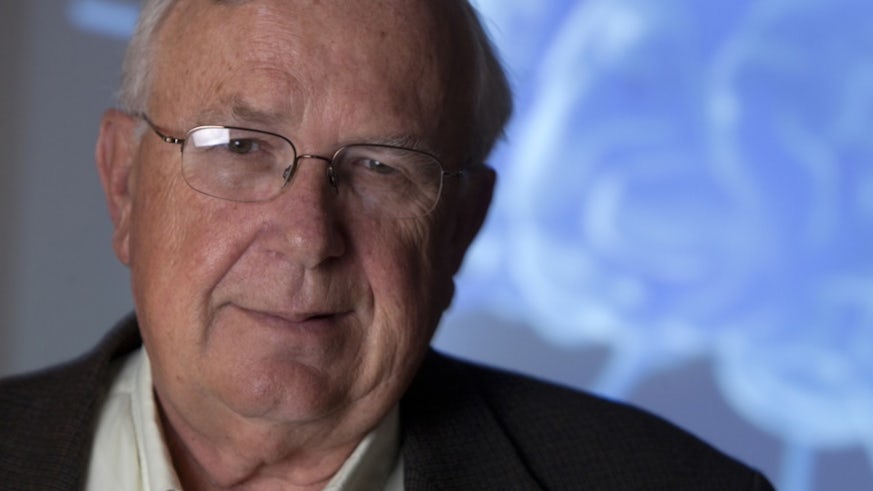Praise for speaker’s ‘messages of hope’ at annual public lecture
20 March 2017

World-renowned neuroscientist Dr Michael Merzenich delivers a stirring talk on brain plasticity at the annual Raymond and Beverly Sackler Foundation Distinguished Lecture in Neuroscience in honour of Professor Sir Keith Peters.
Dr Michael Merzenich, who is a Professor Emeritus Neuroscientist at University of California, spoke with passion about the ‘rejuvenation of an aging brain’ during his thought-provoking public lecture at the University’s Julian Hodge Building.
The Brain Plasticity Revolution: Managing Brain Health explained how negative changes to the brain occur and how they can be reversed. Most importantly, Dr Merzenich motivated the audience into understanding how, regardless of age, we have a significant degree of control over improving and maintaining our own brain health.
Soft-wired brain
Introducing the concept of neuroplasticity, homage was paid to American Psychologist William James, who first proposed the theory in his seminal 1890 publication, The Principles of Psychology. James wrote: “Organic matter, especially nervous tissue, seems endowed with a very extraordinary degree of plasticity.”
Dr Merzenich explained: “Capacity to change is a lifelong resource. Far from a hard-wired structure, the brain does not cease to be malleable.
“As a young scientist, it became important for me to examine the rules that govern this ability for change so that we can put such research to use and help those who are struggling with a variety of brain disorders.”
By comparing changes in the brain using a series of tests and MRI scans, Dr Merzenich has been able to analyse how humans acquire and refine the special skills and abilities that work together to create an individual ‘you’.
By reading regularly, for instance, an otherwise non-reader can nurture a ‘reading brain’, with changes in the brain showing clearly on MRI scans.
The impact of ‘brain noise’
In older people, Dr Merzenich identified that a development of ‘chatter’ or ‘brain noise’ often occurs, by which he refers to the factors that restrict a person from being highly functioning. Additional contributors to brain noise can include any number of factors ranging from alcohol/drug addiction to suffering with conditions such as bipolar disorder, multiple sclerosis or Parkinson’s disease.
Dr Merzenich contests that the sedentary lifestyle of citizens in the USA spending on average 11 hours each day sitting in a chair is in itself a contributor to ‘growing noise’ in an older person’s brain.
“As the brain ages, more effort and input is needed to operate at the same level it once did,” Dr Merzenich explained. “For instance, if a trained musician stopped playing for a few weeks, his skills will be rusty. After 10 years, he will require an intense level of practicing in order to deliver his best standard of music that he once delivered with minimal input. The point is, brain plasticity means that regaining the top level of expertise is possible with the correct training.”
Watch Dr Michael Merzenich's brain plasticity lecture
Watch Dr Michael Merzenich's presentational talk
Controlling the plasticity genie
Around 20 years ago, Dr Merzenich decided to compare older brains against younger ones, and identified that strategic brain training games played a vital role in reversing the changes taking place in aging brains.
The brain’s ‘processing speed’, which provides one simple indicator of the brain’s organic health status, was measured in both demographics. Older participants were then invited to complete challenges designed to re-train the brain’s processing speed and multi-tasking abilities. Results showed that the 60-year-old trained brain possessed the same health status as the 20-year-old brain.
“It is a common misconception that our brains become irretrievably ‘hard-wired’ with age,” said Dr Merzenich. “We now know that it simply isn’t true. The real question is how can we control the plasticity genie?
“Cognitive restoration can only be achieved through particular types of brain training in order to turn an older brain into a ‘younger’ and rejuvenated one.
“If you take an older, cognitively struggling animal who has faced difficult life conditions and re-train its brain using a series of individually tailored tasks, the animal’s life is likely to be extended as the brain is much healthier. It is the same with people.
“Through multiple forms of brain training activities, all negative changes attributable to aging in the animals that we recorded were reversed. This rejuvenation demonstrated a whole range of impacts, including improving the brain’s processing speed, responses, coordination, and numerous others.
“This is clear evidence that the brain is continuously ‘plastic’ and changing itself. Research into the extent to which a life can be extended by rejuvenating brain health is, however, still a work in progress.”
Treating neurological conditions
So, can such brain training in humans delay or prevent the progression of symptoms in dementia and Alzheimer’s disease (AD) patients? Dr Merzenich believes so.
According to Dr Merzenich, carefully targeted brain training may even be used to treat depression, schizophrenia (and other psychosis), traumatic brain injury survivors, and delay the onset of conditions such as Huntington’s disease (HD).
“There has been a revolution in brain science that shall transform neurological psychiatric medicine,” said Dr Merzenich.
Dr Merzenich concludes his lecture with a valuable piece of parting advice, saying: “Stop focusing on personal decline; instead focus on personal growth. Live life to the advantage of your brain with new learning, skill development and being kind to people as it will in turn make you happy and your brain benefits. Challenge yourself!”
About Dr Michael Merzenich
Dr Merzenich has been conducting research into defining the functional of the auditory and somatosensory nervous systems for nearly five decades. In recognition of his huge contribution to brain plasticity research, he was awarded the prestigious Kavli Prize, in 2016.
Now the Director of the Brain Plasticity Corporation Institute, Dr Merzenich is also the co-founder of Scientific Learning and CSO of Posit Science Corporation. His pioneering research in neuroplasticity has resulted in the release of his latest book, Soft-Wired, and the creation of brain training website, www.brainHQ.com.